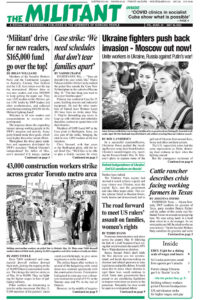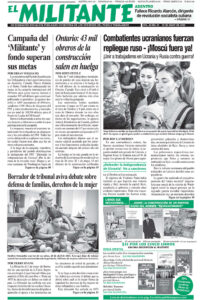Public anger exploded in Sri Lanka May 9 after several hundred supporters of Prime Minister Mahinda Rajapaksa, many armed with iron bars, attacked peaceful protesters camped out in Colombo, the country’s capital. Police did little to stop the attack that left nine hospitalized and up to 150 injured. Two of the main campsites were burned down.
“They started destroying everything,” Kasumi Ranasinghe Arachchige told the media, describing the damage to the tents, including temporary showers and a library. “It seemed as if they knew what and who to look for.”
Within hours of the attack, the prime minister was forced to resign. Three other members of the Rajapaksa family have resigned from the cabinet since April. A central demand of the weekslong upsurge has been for the ouster of President Gotabaya Rajapaksa, the prime minister’s brother, and his government.
Soaring inflation, spreading power outages and shortage of food and fuel are devastating the lives of millions in Sri Lanka. The country’s inflation was 30% in April, with food prices up nearly 50% from a year earlier. Weeks of largely peaceful protests by tens of thousands of workers, farmers and youth have demanded change. On April 28 more than 100 trade unions carried out a one-day nationwide strike.
Hundreds of protesters remain in what is dubbed, “Gota-Go Village,” demanding that President Rajapaksa step down. A coalition of labor unions has set up a tent next to a group representing the deaf. Political groups, disabled veterans and students fill other tents. There are booths of artists and photographers, a tent for discussing constitutional issues, and vans with lawyers and medical volunteers.
The COVID-19 pandemic, which gutted the country’s tourist trade; skyrocketing inflation, including the fuel price hikes exacerbated by Moscow’s war against Ukraine; and billions in high interest loans from China negotiated by the former prime minister have left the country on the brink of bankruptcy. Nearly $7 billion of its $25 billion in foreign debt is due for repayment this year.
The pro-government attack unleashed a widespread response of violence and anger overnight, with pro- and anti-government supporters clashing for the first time since protests began in March. At least eight people died, more than 200 people were wounded and over 100 houses damaged, including several government officials’ homes. The government authorized the military and police to arrest people without warrants and approved shoot-on-sight orders against anyone they deem involved in violent protests.
The government had reimposed a state of emergency May 6 after police fired tear gas and arrested students protesting near parliament.
The president appointed Ranil Wickremesinghe as the new prime minister — it would be his sixth term in office. “We have a president who has lost the legitimacy of the people,” a spokesman for the Tamil National Alliance told the press, “and now a prime minister who never had the legitimacy of the people.”
Attempting to shift the blame for the crisis onto the protesters, President Rajapaksa said on Twitter, “I urge all Sri Lankans to reject the subversive attempts to push you toward racial and religious disharmony.” But the fact is, he was the defense secretary, and his brother, Mahinda, was president, during the final phase of Sri Lanka’s three-decade-long civil war that ended in 2009 with the crushing of the Tamil Tigers. According to a United Nations report, 40,000 Tamil civilians were killed in the final months of that war.
Some 70% of Sri Lanka’s 22 million people are Buddhists; 12.6% are Hindus, mostly ethnic Tamils; 9.7% are Muslims; and 6.1% Christians.
In 2019 Islamist terrorists carried out a series of bombings, killing nearly 270 people, an action denounced by Muslims across the country. The Gotabaya Rajapaksa-led government shut down more than 1,000 Islamic schools and banned the wearing of the burqa.
The recent protests have been marked by rejection of religious and ethnic divisions. “Nobody brought us here. We organized ourselves,” tea farmer Charith Weliwatta told the press at the tent camp. “Tamils, Muslims, Burghers, Sinhalese, we are all here. They can’t divide us any more.”
The government continues efforts to seek a financial bailout with the International Monetary Fund and elsewhere. Wickremesinghe met with Indian officials May 13. New Delhi is battling China for influence in the strategically important country, which lies on key shipping lanes between Asia and Europe.

